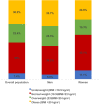Impact of the Obesity Paradox Between Sexes on In-Hospital Mortality in Cardiogenic Shock: A Retrospective Cohort Study
- PMID: 35658518
- PMCID: PMC9238714
- DOI: 10.1161/JAHA.121.024143
Impact of the Obesity Paradox Between Sexes on In-Hospital Mortality in Cardiogenic Shock: A Retrospective Cohort Study
Abstract
Background Several studies have shown that obesity is associated with better outcomes in patients with cardiogenic shock (CS). Although this phenomenon, the "obesity paradox," reportedly manifests differently based on sex in other disease entities, it has not yet been investigated in patients with CS. Methods and Results A total of 1227 patients with CS from the RESCUE (Retrospective and Prospective Observational Study to Investigate Clinical Outcomes and Efficacy of Left Ventricular Assist Device for Korean Patients With Cardiogenic Shock) registry in Korea were analyzed. The study population was classified into obese and nonobese groups according to Asian Pacific criteria (BMI ≥25.0 kg/m2 for obese). The clinical impact of obesity on in-hospital mortality according to sex was analyzed using logistic regression analysis and restricted cubic spline curves. The in-hospital mortality rate was significantly lower in obese men than nonobese men (34.2% versus 24.1%, respectively; P=0.004), while the difference was not significant in women (37.3% versus 35.8%, respectively; P=0.884). As a continuous variable, higher BMI showed a protective effect in men; conversely, BMI was not associated with clinical outcomes in women. Compared with patients with normal weight, obesity was associated with a decreased risk of in-hospital death in men (multivariable-adjusted odds ratio [OR], 0.63; CI, 0.43-0.92 [P=0.016]), but not in women (multivariable-adjusted OR, 0.94; 95% CI, 0.55-1.61 [P=0.828]). The interaction P value for the association between BMI and sex was 0.023. Conclusions The obesity paradox exists and apparently occurs in men among patients with CS. The differential effect of BMI on in-hospital mortality was observed according to sex. Registration URL: https://www.clinicaltrials.gov; Unique identifier: NCT02985008.
Keywords: body mass index; cardiogenic shock; critical care; mortality; obesity; prognosis.
Figures


Comment in
-
Is There an Obesity Paradox in Cardiogenic Shock?J Am Heart Assoc. 2022 Jun 7;11(11):e026088. doi: 10.1161/JAHA.122.026088. Epub 2022 Jun 6. J Am Heart Assoc. 2022. PMID: 35658482 Free PMC article. No abstract available.
References
-
- van Diepen S, Katz JN, Albert NM, Henry TD, Jacobs AK, Kapur NK, Kilic A, Menon V, Ohman EM, Sweitzer NK, et al. Contemporary management of cardiogenic shock: a scientific statement from the American Heart Association. Circulation. 2017;136:e232–e268. doi: 10.1161/CIR.0000000000000525 - DOI - PubMed
Publication types
MeSH terms
Associated data
LinkOut - more resources
Full Text Sources
Medical
Research Materials

